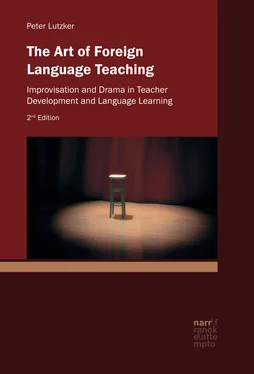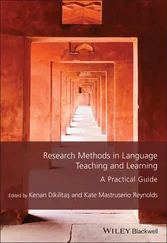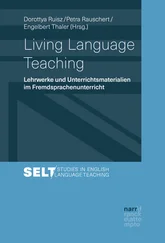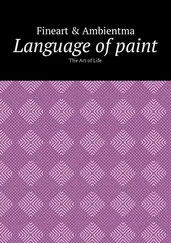Before specifically discussing and evaluating those courses, it will be necessary to gain a clearer understanding of the larger frameworks in which they took place. In almost all of these cases, the clowning workshops were not artistic courses for language teachers standing on their own, but were inextricably tied to the concept of an entire program, including daily lectures, methodology sessions, seminars and other artistic courses.184 Hence, each of these programs was created with the intention of realizing a vision of language teaching within a coherent framework: within that conceptual structure, the artistic work, including the clowning courses, played a decisive role. It will thus be necessary to first consider that wider vision before focusing on a specific course. In this context, the particular focus will be on the English Week , not only because of the larger number of participants (and responses), but also because it is the only on-going program: the English Fortnight whose course leaders were almost identical with the English Week was, in effect, integrated into the English Week , and the Baltic Seminar was a three year in-service program lasting from 2002–2005.185
3 Steiner Schools’ In-Service Training for English Teachers: The English Week
The English Week was founded in Germany in 1996 by Norman Skillen (formerly Steiner School, Capetown, South Africa, Institut für Waldorfpädagogik Witten-Annen ), Silvia Albert-Jahn ( Waldorfschule, Mülheim-Ruhr), and myself.186 It has taken place at different conference centres throughout Germany, in recent years in Altenberg. Each year’s conference has had a different theme: some of the themes of previous years include Moving Language, Artistic Processes and Language Teaching, Encountering the Other, Transcending Borders, Inspiration and Intuition in Language Teaching , and Embracing the Unexpected: Courage and Creativity in Language Teaching . In the meantime, the English Week has become the largest international Steiner Schools language teachers’ conference with more than 100 English teachers coming from Germany, Switzerland, the Netherlands, Austria, France, Russia, Hungary, Czech Republic, Slovenia, Italy, Finland and the United Kingdom.187 The growing popularity of the English Week among Steiner schools has not only been borne out by the increasing number of participants, but in reports and articles in different journals.188 In the meantime, the approach and structure of the English Week have also been adopted by leading in-service and pre-service programs in Steiner Schools in Germany and throughout Europe.189
What one of the participants once wrote in an article, gives a general impression of the nature of the English Week .
I’m actually quite stupid. I am now writing a report about the last “English Week”, the sixth one. I shouldn’t do that – I should keep it a secret. The “English Week” is so good that more and more teachers want to go there. If I want to have a chance to go there again, then I should definitely not tell any of my English colleagues about it!
Only speaking English for a whole week. Teacher development, methodological training, support – that all happens by itself and along the way. And for schools it is certainly less expensive than sending colleagues to England. Considering this, in my opinion, it should be possible to find a substitute for a week.
I was there for the second time. The timetable and the instructors are similar every year and yet it all still generates enthusiasm and freshness. One truly feels like a member of the “extended family” of English Waldorf teachers: one has so much in common with each participant.
The emphasis lies on the dramatic arts. Theatre work – a number of hours a day. Whoever has never experienced something like this, can hardly imagine how much one is transformed through such work and how intense this becomes in the course of the week. For me, the artistic emphasis is the most refreshing aspect of the “English Week”. There, Steiner’s requirement that the Waldorf teacher should “work artistically” is put into practice and one directly senses the fruits of such work.190 (italics in original)
Recognition of the English Week outside of Steiner Schools has also increased in recent years, particularly through contacts with various guests who have taken part, including Prof. Hans Hunfeld, Prof. Hans Eberhard Piepho (†), Prof. Werner Bleyhl, Prof. Alan Maley, Prof. Manfred Schewe, Prof. Engelbert Thaler, Chaz Pugliese and Mario Rinvolucri. In recent years, course leaders have regularly written about their work in the widely read online language teaching journal Humanizing Language Teaching. 191 They have also increasingly been asked to give workshops and courses similar to those which they have given at the English Week at a variety of international teachers’ courses and conferences.192
3.1 The Concept of the English Week
In the annual invitation sent out to Steiner Schools there is always a short paragraph taken from the invitation to the first English Week which briefly describes the underlying concept of the whole course. The following excerpt is taken verbatim from the invitation to English Week 2006:
The idea of an English Week was born ten years ago out of our conviction that intensive artistic work with actors, directors, storytellers and clowns, would be of immeasurable benefit for foreign language teachers. The experiences and feedback that we’ve had from the last nine years of working with outstanding professionals like Vivian Gladwell, Robert McNeer, Tessa Westlake, David Campbell and Duncan Macintosh have proved to be a resounding confirmation of this concept. Thus, the daily three-hour dramatic workshops continue to remain a keystone of the entire English Week. As in previous years, there will be morning lectures based on the general conference theme and in the afternoons there will continue to be a wide variety of working groups addressing different methodological issues and questions. The evenings are full of the “Spirit of English” in the forms of lectures, songs and dances. Another tradition we have maintained has been to encourage an open exchange with leading authorities in foreign language teaching outside of Waldorf circles. Our guests in the past have included Prof. Hans Hunfeld, Prof. Hans Eberhard Piepho, Prof. Werner Bleyhl, Prof. Alan Maley, and Mario Rinvolucri (three times).
The program of the English Week 2005 gives a clear picture of its basic structure during the time in which this study was conducted.193
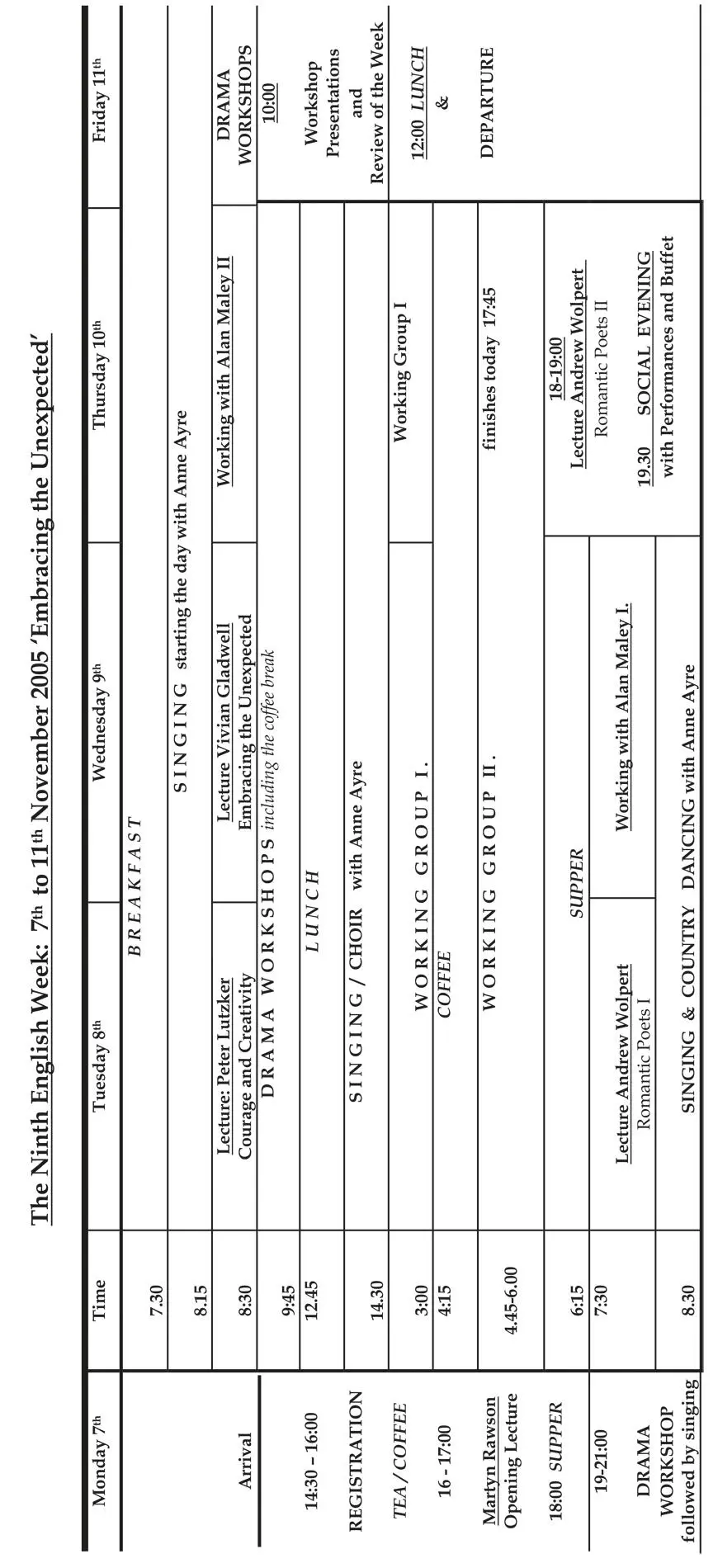
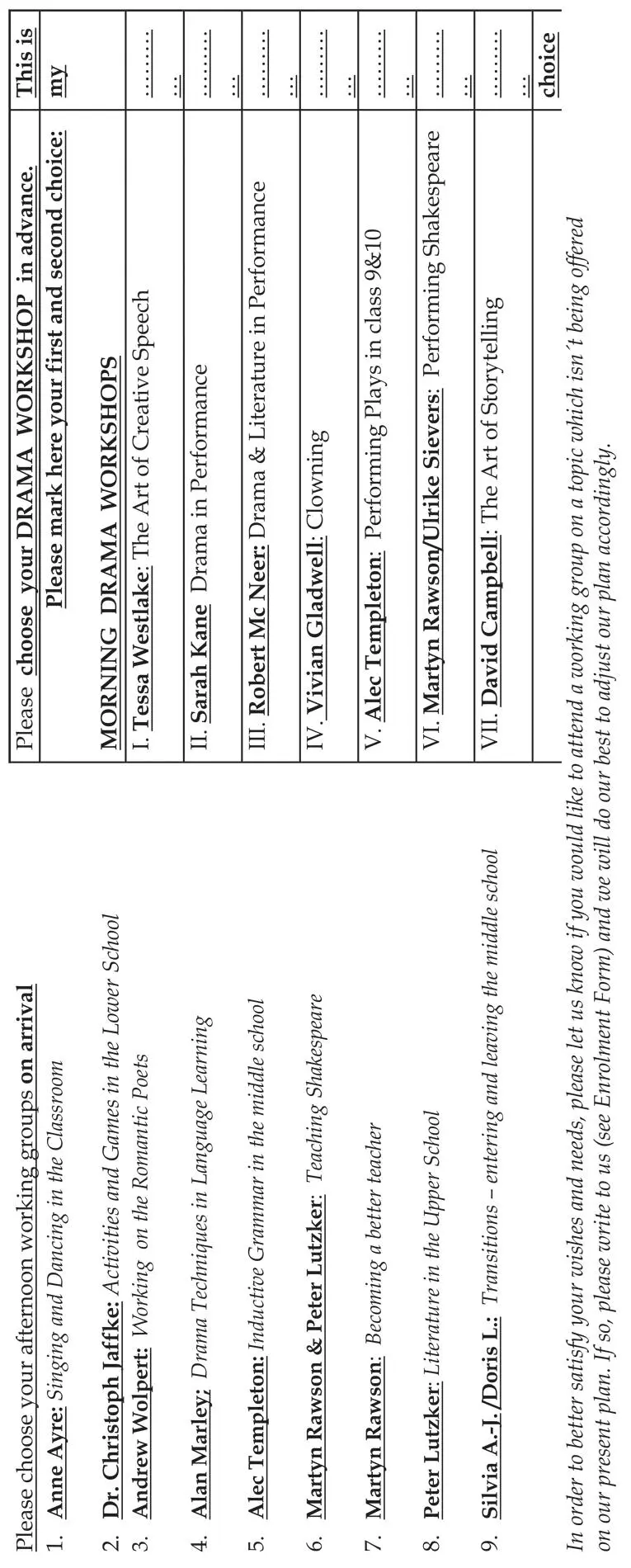
The schedule gives a clear picture of the day’s activities beginning at 8.15 in the morning with singing and ending late in the evening with English folk dancing. Even within the context of a very full program, it is clear that the drama workshops have a unique status in regard to their place in the timetable and with respect to their length.
Although in the context of this study, the focus will be on one of the drama courses which, as it is written in the invitation, we have always considered to be “the keystone of the entire English Week ” it is essential to realize that these courses have always been offered within the general context of a conference theme and framework which is closely tied to the principles of artistic work. Both the lectures as well as the afternoon methodology courses have generally attempted to draw upon and integrate the participants’ experiences in the drama workshops into their own frameworks. Thus, each element of the program including the other artistic activities (choir singing and English folk dancing) can be seen to address related aspects of teaching and learning albeit in a very different context and form. This coherence can be viewed as an essential element of the entire week, exemplifying the common vision of artistry in teaching which we as the organizers have continued to share.
Читать дальше
